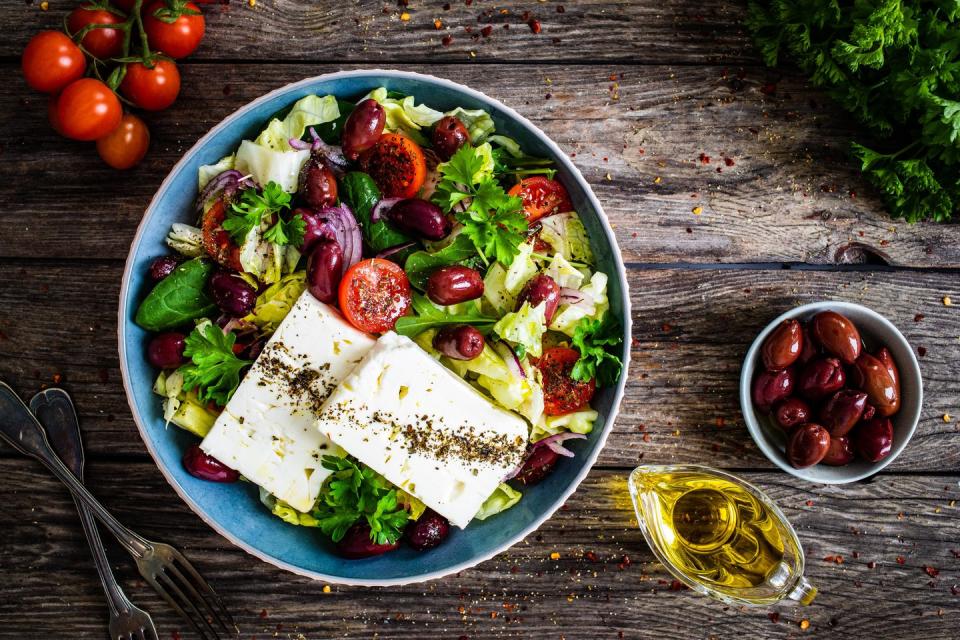Interested in the Mediterranean diet? These 7 dietician-approved tips will get you eating like a Mediterranean

The Mediterranean diet is one of the healthiest – and most popular – diets in the world. Linked to health benefits including lower rates of cardiovascular disease, diabetes, obesity, certain cancers, and better cognitive and mental function, the Mediterranean diet isn’t a strict – or restrictive – way of eating, it’s a lifestyle.
Here are some of the most searched questions about the sunshine and sardine-sprinkled Mediterranean diet, answered by dietician Tai Ibitoye. Here, she fills you in on the ins and outs of this ever-lauded way of eating....
*For individualised medical and dietary advice, please make sure you speak to your GP and Registered Dietitian, respectively.*
What is the Mediterranean diet?
The Mediterranean diet describes the cultural and traditional eating patterns of people from countries that surround the Mediterranean Sea such as Greece, Italy and Spain. The eating pattern is usually based on high intakes of fruits, vegetables, nuts, seeds, pulses (e.g. peas, beans and lentils), whole grains, plant-based oils, and moderate intake of fish rich in omega-3 fatty acids – like salmon, sardines and tuna – lean poultry and moderate intake of red wine with meals. Which, yes, sounds pretty delicious.
Eggs and dairy products like yoghurt and cheese can also be part of the Mediterranean diet, but, again, in moderation.
In addition to this, the diet is generally characterised by low quantities of red and processed meat as well as low consumption of foods of processed foods that tend to be high in saturated fat, salt and free sugars.
Why is it talked about so much?
The Mediterranean diet has gained a lot of attention over the years based on accumulating research showing its potential role in lowering the risk of some health issues like cardiovascular disease. There is evidence to suggest that a Mediterranean diet is cardio-protective as it can reduce low-density lipoproteins (LDL) and triglyceride levels and increased high-low lipoproteins (HDL) levels.
LDL is often termed as the ‘bad cholesterol’ as too much of it can build up inside the walls of the blood vessels. This clogs them up causing narrowing of the arteries which can increase the risk of a heart attack or stroke. HDL is called the ‘good cholesterol’ as it helps remove ‘bad’ cholesterol from the blood.
What are the health benefits of the Mediterranean diet?
1. The Mediterranean diet contributes to better heart health
Several studies have concluded that the Mediterranean diet significantly enhances overall health – and, in particular, heart health. For instance, a 2018 study examined nearly 26,000 women, revealing that those adhering closely to the Mediterranean diet over a 12-year period experienced approximately a 25 per cent decrease in the risk of cardiovascular disease. Researchers attributed this reduction primarily to improvements in blood sugar levels, inflammation, and body mass index.
2. The Mediterranean diet appears to reduce the risk of cognitive decline
A new study in eLife has found weight reduction, particularly from healthy food plans like the Mediterranean Diet, may help improve brain ageing.
Looking at information from over 60,000 seniors, a 2023 study in the medical journal BMC Medicine found that adopting a Mediterranean diet decreases the risk of developing dementia by almost one-quarter, even among individuals with genetic predispositions.
3. The Mediterranean diet reduces the risk of chronic diseases
There is also some evidence to suggest that it can reduce the risk of some cancers, dementia and type 2 diabetes.
A Nurses’ Health Study, which followed 10,670 women ages 57-61 observed the effect of dietary patterns on ageing. Healthy ageing was defined as living to 70 years or more, and having no chronic diseases (such as type 2 diabetes, kidney disease, lung disease, Parkinson’s disease, or cancer) or major declines in mental health, cognition, and physical function. The study found that the women who followed a Mediterranean-type eating pattern were 46% more likely to age healthfully. This was attributed to higher consumption of plant-based foods, whole grains, and fish, along with moderate alcohol intake, and reduced consumption of red and processed meats.
However, more research is needed to make it conclusive as other factors, like environmental, social and lifestyle, as well as existing medical conditions and genetics, can contribute to the increased or reduced risk of these conditions.
Having said this, eating a variety of foods that are included in a Mediterranean diet means you're getting important vitamins, minerals, fibre, omega-3 fatty acids, monounsaturated fat and polyunsaturated fats. These, we know, have beneficial effects on your overall physical and mental health.

How do you eat the Mediterranean diet?
1. Maximise your fruit and vegetable intake
Aim to have at least five portions, every day (bonus points if you get up to eight.) One portion is about a handful (80g) and fresh, frozen, dried and tinned fruit and vegetables all count. To get there, try to eat one or two portions with each meal and make fruit and vegetables your first choice at snack time.
2. Limit your intake of red and processed meats
Instead, substitute with fish, vegetables or pulses instead. Speaking of fish: Eat more. On the Mediterranean diet, you want at least two portions a week, with one being oily fish like salmon or mackerel.
3. Where possible, use mono- or poly-unsaturated fat oils
Like olive oil or rapeseed oil in place of saturated oils and spreads like coconut oil, palm oil, butter or lard.
4. Base your meals on starchy carbohydrates
Like bread, pasta, rice, couscous and bulgur wheat. Where possible, opt for wholegrain starchy carbohydrates.
5. Use fresh herbs
And spices instead of salt in your cooking.
6. Snack on fruits, dried fruit and unsalted nuts
Rather than crisps, cakes and biscuits. However, if you do choose to eat these instead just be mindful of portion sizes. Balance is key.
7. Limit high-salt foods
Limit your intake of foods, snacks and desserts that tend to be high in fat, salt and free sugars.

What might a Mediterranean diet look like?
There are different ways to incorporate the foods of the Mediterranean diet into your diet. Here is my sample menu to get you inspired.
Breakfast
Vegetable omelette with spinach, spring green onions, red bell peppers cooked in a tiny amount of olive oil with wholegrain bread on the side.
Mid-morning snack
Plain Greek yoghurt topped with almonds and berries.
Lunch
A chicken and couscous bowl made with olives, cucumber, roasted red peppers, red onions and spices, dressed with freshly squeezed lemon.
Mid-afternoon snack
Carrot, cucumber and celery sticks with hummus dip and a small handful of unsalted cashew nuts.
Dinner
Grilled salmon served with roasted potatoes (with skin on, to boost fibre content), cherry tomatoes, asparagus and yellow bell peppers and a small glass of red wine (the latter is optional!)
So... do I need to follow the Mediterranean diet?
The Mediterranean diet is not a prescription diet as such, but more of a style of eating and living. It actually goes beyond just focusing on food to consume more or reduce for health reasons. There is an emphasis on how we eat – encouraging us to take time with our meals, enjoy meals with others and rest after meals too. The Mediterranean lifestyle also encourages participation in leisure activities, including physical activities and making sure we have a good amount of sleep too.
Following a Mediterranean diet is one style of healthy eating, but it is not the only one. There are other ways people can adopt healthy eating principles as outlined in the Eatwell Guide, which is the UK’s healthy eating guidelines. The Eatwell Guide shows how much of what we eat overall should come from each food group (fruit and vegetables, starchy carbohydrates, protein, dairy and alternatives, and oils and spreads) to achieve a healthy, balanced diet.
There are some people who may not be able to eat some foods included in the Mediterranean diet such as fish and nuts (due to allergies) and so, it is important that you find a healthy eating pattern that works well for you, that you can enjoy and will help meet your individual nutritional and health needs.
It is also worth mentioning that though red wine is typically consumed in moderation in the Mediterranean diet, you should still be mindful of your alcohol intake – it is advised that adults should drink no more than 14 units a week and consider having several alcohol-free days during that time. Also, don't save up your units and drink them all in one go – that is definitely not the idea.
Tai Ibitoye (@taitalksnutrition) is a UK Registered Dietitian with postgraduate degrees in Dietetics and Nutrition and Human Nutrition. She is currently a doctoral researcher in Food and Nutritional Sciences.
Cut through the noise and get practical, expert advice, home workouts, easy nutrition and more direct to your inbox. Sign up to the WOMEN'S HEALTH NEWSLETTER
You Might Also Like


